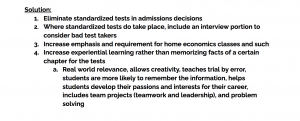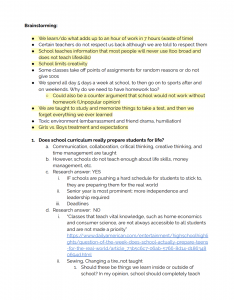The two problems that I solved through this assignment were school curriculum preparation and standardized testing accuracy. In my opinion, basic ideas such as critical thinking, creative thinking, collaboration, communication, and time management are taught in certain classes. Still, I don’t believe that schools teach enough life skills such as how to change a tire, sew, cook, or manage your money. When I researched this topic, I found two different opinions. The side that answered yes said that schools pushing strict schedules and challenging students with advanced classes are preparing students for the future. They also noted that meeting deadlines in school work is a form of preparation. The last thing that stood out to me from this side was that senior year of high school is most important because it teaches leadership skills, and you have more freedom, which you will have in real life. The side that answered no said that classes relative to real-life aren’t emphasized enough or easily accessible to all students.
My next question was, “Is standardized testing an accurate representation of a student’s success in the future?” To answer this, I think that standardized tests are wildly inaccurate because different schools will teach various topics in various ways. Second, bad test takers are not taken into consideration with testing such as the ACT or SAT. Research on this topic said that standardized tests give an unfair advantage to those who can pay to get help, and they put a lot of pressure on kids to do well. They also limit the ability for teachers to adapt to learning differences and overall give an inaccurate measure for success. A quote found in “34 Problems with Standardized Tests” says
“Schools teach knowledge, but for life, you need wisdom.”
Coach Hoang said that the School curriculum focuses on the academics side rather than the real-life side. He thought that the application of material is what should be taught more. Eden believed this was an accurate problem and said that schools could add classes to the curriculum based on life skills. Ryleigh thought standardized testing scores should be replaced with GPA numbers for things like college admissions. And lastly, Mrs. Purnell counter-argued that curriculum does teach communication, time management, and more, just not as day-to-day life skills like manners or economics. However, she did agree that standardized tests are biased with how they’re written. They exclude life experiences from all races, cultures, and classes. Overall, standardized tests are very one-dimensional.
I concluded that this problem could be solved by eliminating standardized test scores in college admissions, including an interview portion of tests for the sake of bad test-takers, making essential classes such as home economics 100% required and easily accessible, and lastly, increasing the use of Experiential learning. Experiential learning consists of labs, field trips, and hands-on activities. A few pros of this include more significant levels of real-world relevance, creativity, trial by error, better memorization, development of interests for maybe a future career, and skills such as teamwork, leadership, and problem-solving.
During the first class period, I based my five questions on key points from my brainstorming bullets while also adding anything that came to mind. I chose questions I knew I could elaborate on with previous knowledge and questions with conflict and conclusions I could later research. I answered each question as best I could in ten minutes. For the remainder of class time, I found sources and began reading about others’ opinions online. My next major step was continuing my research and forming a final problem statement. The next day, I spent most of my time speaking to my classmates and two teachers about their opinions on my previous problem. I then talked to Mrs. Duke and began research on a few of the ideas that will appear in my solution. The last class period was when I developed my final solution and began my presentation. I also made a work plan for myself which consisted of finishing my PowerPoint and starting my visual. Outside of class, I decided that to incorporate my book and the visual of the project, I’d create stations to represent one of my solutions, Experiential learning. The stations represented Experiential learning because they were hands-on and interactive.
One thing that went well during my presentation was that I was significantly less nervous than I usually am. I felt comfortable sharing my opinions because I had such strong feelings towards the topic and knew exactly what to say. I was very prepared for my lesson too, and I hope it showed through to the class.
During the feedback process, I did get many classmates to agree with my perspective, which shows that I had reasonable, feasible solutions. However, ways to improve them were brought to my attention. I hadn’t included research statistics in my slideshow, which can be very eye-catching to audiences, and I was missing detail. If I were going to change anything about my solutions, I would add an online interview portion to standardized tests where they did occur to make them more accessible to students everywhere. Overall, I learned that no solution would please both teachers and students 100%. I also learned that you don’t always see the gaps until you receive feedback from other people.
Looking back to the beginning of this year, I never fully understood books, which didn’t bother me. I’d skim through a few chapters a day, and if I felt confused, I wouldn’t stop. Now, I understand books better because I’ve learned to pick them apart and re-read if necessary. I wouldn’t say I suddenly like reading, because I don’t think that would be completely honest, but it is less dreadful.
WORKS CITED
Marker, E. (2019, January 23). Question of the WEEK: Does school actually PREPARE teens for the real world? Retrieved May 11, 2021, from https://www.dailyamerican.com/entertainment/highschoolhighlights/question-of-the-week-does-school-actually-prepare-teens-for-the-real-world/article_73b5c6c7-06ab-5766-8d14-d1863480694d.html
Strauss, V. (2019, April 18). Analysis | 34 problems with standardized tests. Retrieved May 11, 2021, from https://www.washingtonpost.com/news/answer-sheet/wp/2017/04/19/34-problems-with-standardized-tests/
Admissions alternatives at large public universities. (n.d.). Retrieved May 11, 2021, from https://www.fairtest.org/admissions-alternatives-large-public-universities
Top 12 ways to bring the real world into your classroom. (2020, May 19). Retrieved May 11, 2021, from https://www.teachhub.com/classroom-activities/2010/05/top-12-ways-to-bring-the-real-world-into-your-classroom/
Frazier, L. (2019, September 13). Study shows link between early education and future career success. Retrieved May 11, 2021, from https://www.forbes.com/sites/lizfrazierpeck/2019/09/13/study-shows-link-between-early-education-and-future-career-success/?sh=16dd316759bd
The benefits of experiential learning. (n.d.). Retrieved May 11, 2021, from https://www.envisionexperience.com/blog/the-benefits-of-experiential-learning






